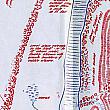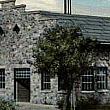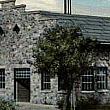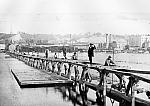
Grand Rapids Water Story, 19th Century, Part VI
The charter of the Grand Rapids Hydraulic Company conveys broad powers, and is claimed to the perpetual. It was granted by the state legislature in the session of 1840. This charter is, to a considerable degree, the backbone of the company. Upon it largely depends the future of the institution.
In substance, the charter is as follows: Section 1. Be it enacted by the senate and house of representatives of the state of Michigan, that George Coggershall, Thomas Sinclair, Charles Shepard, Canton Smith, and James M. Nelson, and their present and future associates, their successors and assigns, be, and they are hereby created a body corporate and politic, by the name of the “President and directors of the Grand Rapids Hydraulic company,” and are hereby ordained, constituted and declared to be, forever hereafter, a body corporate and politic in fact and in name; and by the name, they and their successors shall, and may have continual succession, and shall be persons in law capable of suing and being sues . . . and also, that they and their successors, by the same name and style, shall be in law, capable of purchasing, holding, and conveying any estate, real and personal for the use of said corporation, provided that the real and personal estate so to beholden, shall be such only as shall be necessary to promote or attain the objects of this incorporation.
Capital Stock Only $30,000
Section 2. That the capital stock of the said corporation shall not exceed $30,000, and that a share in the said stock shall be fifty dollars . . .
Section 3. That the stock, property and concerns of said company shall be conducted and managed by five directors, who shall be stockholders, and residents of the said village of Grand Rapids, which directors shall hold their office for one year from the first Tuesday of May, in every year; and the said directors shall be elected on the first Tuesday in May in every year . . . and the said election shall be made by such of the stockholders of the said company as shall attend for that purpose in their proper persons, or by proxy.
Directors Must Live Here
And the said directors as soon as may be after the election shall proceed in like manner to elect by ballot one of the number to be their president; and if any of the directors so to be elected shall at any time remove out of the village of Grand Rapids, the office of such director or directors shall be considered as vacant . . .
Section 4. That the directors shall have power to appoint the time and place of all meetings for the dispatch of business, to appoint all such officers, agents, clerks, superintendents and servants, as they shall deem necessary for carrying into effect the powers by this act vested in said company, and to establish rules and regulations for and concerning the conduct and government of such officers, agents, clerks, superintendents and servants.
Broad Rights of the Company
Section 5. That it shall be lawful for the said company and person or persons employed by them, or acting under their authority, to enter into and upon, and freely to make use of, for the sole purpose contemplated by this act, any land which may be necessary for the purpose of conducting a plentiful supply of pure, wholesome water to the said village for the use of the inhabitants of said village, and to supply reservoirs for the extinguishing of fires. Said supply of water shall be obtained from the springs of water in and about said village; from Coldbrook; from the lake or lakes, from which it has its source, or from either of them, and from no other source; and to erect any dam or other works across said Coldbrook or springs where they shall judge proper for the purpose of raising the water of said Coldbrook, springs, lake, or lakes, and to construct, dig, or cause to be opened any trenches for the conducting of such water from said springs, Coldbrook, lake or lakes, that they may see fit; and to raise the construct such dykes, mounds, and reservoirs and they may judge proper for securing and conveying such supply of water as aforesaid to the said village.
The said Grand Rapids Hydraulic company shall not use the water or improvements made or obtained under this act of incorporation for the purpose of propelling any machinery, or for the other purpose than that of supplying the city of Grand Rapids with a pure, wholesome supply of water for household purposes and domestic uses, and to supply reservoirs for the extinguishing of fires; and the said company shall not, in any manner, injure or interfere with any water power, and to agree with the owner or owners of any lands, tenements or hereditaments that may be damaged or affected by any of the said operations, for and about a reasonable compensation to be made to him, her, or them for such lands, tenements, or hereditaments, or the use thereof as may be used, or occupied for the purpose aforesaid . . . but in the case of any disagreement . . . it shall be lawful for the supreme judges of this state, or any of them, to appoint three indifferent persons, to view, examine and survey said lands, tenements and hereditaments, and to estimate the injuries sustained as aforesaid and to report thereupon to said judge or judges . . . and upon confirmation of said report by said judge or judges the said president, directors, and company shall pay to the said owners respectively the sums mentioned in such report in full compensation for the said lands, tenements and hereditaments, or for the injury sustained as aforesaid, as the case may be.
Section 6 (Concerns publication of notice of investigation by three indifferent persons.)
Further Rights of Company
Section 7. That it shall be lawful for the said company . . . to enter upon any lands contiguous or near to said stream, fountains, aqueducts, dams or other works, or the places which may be selected for the same, with carts . . . and all necessary tools and implements, both for executing and making, and also for altering and repairing said works, and to take and carry away timber, stone, gravel, sand or earth for the same . . . subject always to the making compensation for all actual damages thereby occasioned . . .
Section 8. (Gives company power to make rules and by-laws regulating its business, and to make rates for water. It has a proviso, as follows:
Provided, That the said company shall within five years from the passage of this act, furnish and continue with no unreasonable delay, a supply of pure and wholesome water, sufficient for the use of all such citizens dwelling in the said village, as shall agree to take it on the terms to be demanded by said company, in default whereof the said corporation shall be dissolved.
Section 9. (Relates to call for money subscribed for stock.)
Protection from Interference
Section 10. That if any person or persons shall willfully do or cause to be done any act whatsoever whereby the said works or any pipe, conduit, canal, watercourse, mound, plug, cock, reservoir, dike or any engine, machine or structure or ant matter or thing appertaining to the same shall be stopped, obstructed, impaired, weakened or injured the person or persons offending shall forfeit and pay to the said company treble the amount of damages sustained by means of such offense or injury to be recovered by such company with costs of suit, and by action of trespass or trespass on the case in any of the courts of this state. . .
Section 11. Said company shall be entitled to the benefits and subject to the restrictions of Chapter LV of the revised statutes of 184886, so far as the same may be applicable and not inconsistent with this act. The legislature may at any time hereafter amend or repeal this act.
Rights Given by the Council
In April 1860, the company was given certain specific rights by the common council, which very complacently took the following action:
“Petition of A. Roberts, president, and S. L. Withey, secretary, of the Grand Rapids Hydraulic Company, asking that said company be granted the right to use the streets not now paved, and the lands and alleys within the city for the purpose of laying, maintaining and using pipes or conductors through which to convey water for the use of the inhabitants of said city, was presented, accepted and the prayer of the petitioner granted.”
The vote was 5 to 4, some of the aldermen apparently realizing the value of the rights sought.
Grand Rapids Press, October 18,1904
Transcribed by Rebecca Smith-Hoffman
Article posted May 8, 2014

 facebook
facebook











